Jeep Compass vs VW Tiguan - Differences and prices compared
Compare performance (213 HP vs 272 HP), boot space and price (34200 £ vs 33300 £ ) at a glance. Find out which car is the better choice for you – Jeep Compass or VW Tiguan?
Costs and Efficiency:
Price and efficiency are key factors when choosing a car – and this is often where the real differences emerge.
VW Tiguan has a minimal advantage in terms of price – it starts at 33300 £ , while the Jeep Compass costs 34200 £ . That’s a price difference of around 900 £.
Fuel consumption also shows a difference: VW Tiguan manages with 1.40 L and is therefore significantly more efficient than the Jeep Compass with 5.80 L. The difference is about 4.40 L per 100 km.
As for electric range, the Jeep Compass performs decisively better – achieving up to 500 km, about 374 km more than the VW Tiguan.
Engine and Performance:
Under the bonnet, it becomes clear which model is tuned for sportiness and which one takes the lead when you hit the accelerator.
When it comes to engine power, the VW Tiguan has a clearly perceptible edge – offering 272 HP compared to 213 HP. That’s roughly 59 HP more horsepower.
In acceleration from 0 to 100 km/h, the VW Tiguan is decisively quicker – completing the sprint in 5.90 s, while the Jeep Compass takes 8.50 s. That’s about 2.60 s faster.
In terms of top speed, the VW Tiguan performs distinct better – reaching 242 km/h, while the Jeep Compass tops out at 188 km/h. The difference is around 54 km/h.
There’s also a difference in torque: VW Tiguan pulls to a small extent stronger with 400 Nm compared to 345 Nm. That’s about 55 Nm difference.
Space and Everyday Use:
Whether family car or daily driver – which one offers more room, flexibility and comfort?
Both vehicles offer seating for 5 people.
In curb weight, VW Tiguan is slight lighter – 1599 kg compared to 1667 kg. The difference is around 68 kg.
In terms of boot space, the VW Tiguan offers to a small extent more room – 652 L compared to 550 L. That’s a difference of about 102 L.
In maximum load capacity, the VW Tiguan performs slight better – up to 1650 L, which is about 89 L more than the Jeep Compass.
Who wins the race in the data check?
The VW Tiguan holds a decisive overall lead in the objective data comparison.
This result only shows which model scores more points on paper – not which of the two cars feels right for you.
Costs and Consumption
View detailed analysis
Engine and Performance
View detailed analysis
Dimensions and Body
View detailed analysis

VW Tiguan
Jeep Compass
The Jeep Compass packs classic Jeep styling with a surprisingly composed demeanor, equally at home turning heads in the city or tackling a weekend dirt track. Inside it's a pragmatic, user-friendly compact SUV that prioritizes comfort and versatility — a smart pick if you want a dose of adventure without giving up everyday sense.
details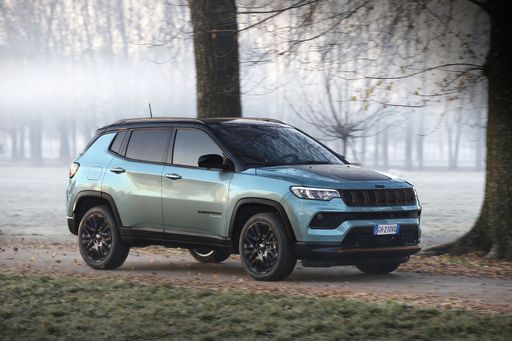
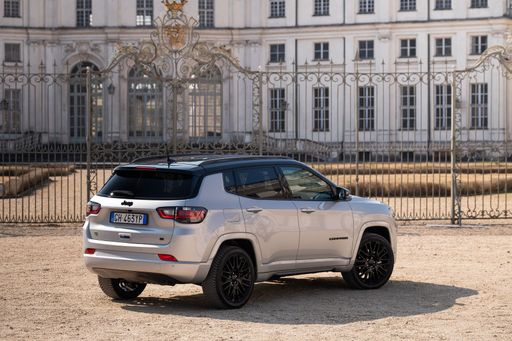
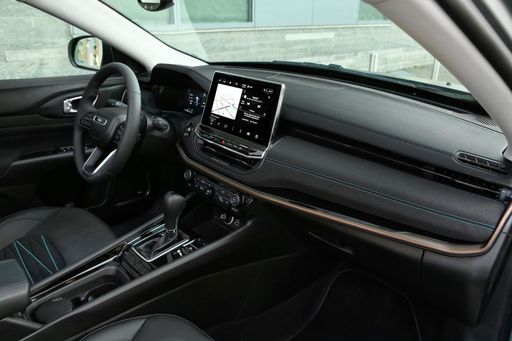
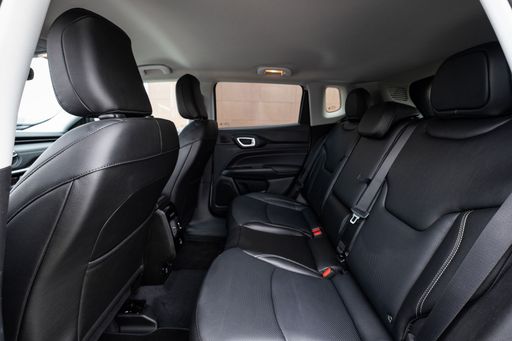
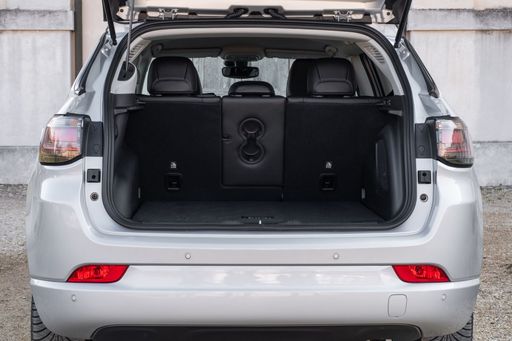
VW Tiguan
The VW Tiguan blends sensible family practicality with a dash of German polish, delivering a calm, reassuring ride and a cabin that never feels like an afterthought. For buyers who want an SUV that’s easy to live with yet still nicely dressed, the Tiguan is the grown‑up choice that keeps a cheeky wink in reserve.
details





Costs and Consumption |
|
|---|---|
|
Price
34200 - 43200 £
|
Price
33300 - 51900 £
|
|
Consumption L/100km
5.80 L
|
Consumption L/100km
1.4 - 8.4 L
|
|
Consumption kWh/100km
17.50 kWh
|
Consumption kWh/100km
-
|
|
Electric Range
500 km
|
Electric Range
118 - 126 km
|
|
Battery Capacity
74 kWh
|
Battery Capacity
19.70 kWh
|
|
co2
0 - 130 g/km
|
co2
32 - 190 g/km
|
|
Fuel tank capacity
55 L
|
Fuel tank capacity
45 - 58 L
|
Dimensions and Body |
|
|---|---|
|
Body Type
SUV
|
Body Type
SUV
|
|
Seats
5
|
Seats
5
|
|
Doors
5
|
Doors
5
|
|
Curb weight
1667 - 2198 kg
|
Curb weight
1599 - 1890 kg
|
|
Trunk capacity
550 L
|
Trunk capacity
490 - 652 L
|
|
Length
4552 mm
|
Length
4539 mm
|
|
Width
1928 mm
|
Width
1842 - 1859 mm
|
|
Height
1675 mm
|
Height
1656 - 1658 mm
|
|
Max trunk capacity
1561 L
|
Max trunk capacity
1486 - 1650 L
|
|
Payload
-
|
Payload
460 - 533 kg
|
Engine and Performance |
|
|---|---|
|
Engine Type
Petrol MHEV, Electric
|
Engine Type
Petrol, Petrol MHEV, Diesel, Plugin Hybrid
|
|
Transmission
Automatic
|
Transmission
Automatic
|
|
Transmission Detail
Dual-Clutch Automatic, Reduction Gearbox
|
Transmission Detail
Dual-Clutch Automatic
|
|
Drive Type
Front-Wheel Drive
|
Drive Type
All-Wheel Drive, Front-Wheel Drive
|
|
Power HP
145 - 213 HP
|
Power HP
130 - 272 HP
|
|
Acceleration 0-100km/h
8.5 - 10.3 s
|
Acceleration 0-100km/h
5.9 - 10.6 s
|
|
Max Speed
180 - 188 km/h
|
Max Speed
210 - 242 km/h
|
|
Torque
230 - 345 Nm
|
Torque
220 - 400 Nm
|
|
Number of Cylinders
3
|
Number of Cylinders
4
|
|
Power kW
107 - 157 kW
|
Power kW
96 - 200 kW
|
|
Engine capacity
1199 cm3
|
Engine capacity
1498 - 1984 cm3
|
General |
|
|---|---|
|
Model Year
2025
|
Model Year
2024 - 2025
|
|
CO2 Efficiency Class
D, A
|
CO2 Efficiency Class
G, D, E, F, B
|
|
Brand
Jeep
|
Brand
VW
|
What drivetrain options does the Jeep Compass have?
The Jeep Compass is available as Front-Wheel Drive.




